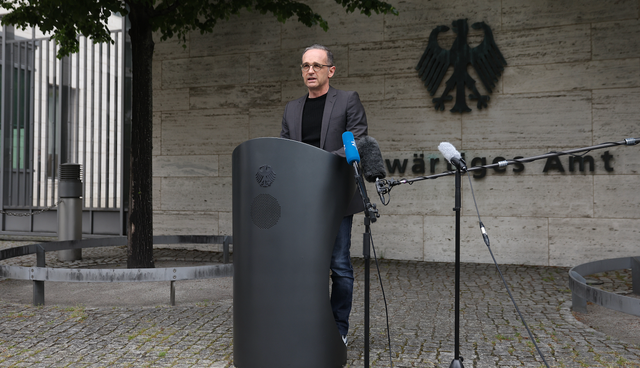(单词翻译:单击)
听力文本
Germany today apologized for a genocide — in this case, the slaughter of tens of thousands of people in the African nation of Namibia. The killings came during the colonial era, when German troops stamped out an uprising in Namibia by almost wiping out two tribes. And in France earlier this week, the government admitted to bear some responsibility for the 1994 genocide in Rwanda. Joining us to talk about these developments is NPR Africa correspondent Eyder Peralta. Welcome back.
EYDER PERALTA, BYLINE: Hey. Thank you for having me.
CORNISH: So to start, why did Germany say now was the time for this acknowledgement?
PERALTA: Yeah. I mean, look; this is a long time coming. Germany and the government of Namibia have been negotiating this for five years. But as you alluded to in your intro, there is, you know, quite a bit of introspection happening on the continent of Africa and in Europe. You know, people and governments are trying to come to terms with the brutality of colonialism. You know, critics say that Germany and other European countries are looking at African countries as an emerging market, and that might be the reason for this apology.
CORNISH: I want to come back to what amends might look like, but first, a little bit of the history. What happened during this uprising? When was this?
PERALTA: Yeah, so as you mentioned, it happened more than a hundred years ago, from 1904 to 1908. And Germany was the colonial power in control of Namibia, and there was a rebellion by the Herero and the Nama tribes, and the German government reacted viciously. They took land and cattle. And many Herero and Nama people were taken to concentration camps in the Kalahari Desert, and many of them died of starvation there. In the end, scholars estimate that about 80% of the Herero and Nama people were killed during this period.

CORNISH: What's been the reaction to the government's plans to offer a billion dollars to help reconstruction and development in Namibia as part of this acknowledgement?
PERALTA: Tribal leaders, you know, say that this is a deal between two governments and that it doesn't really solve the big problems. They say that this will not lead to reconciliation. And the big sticking point is that they wanted individual reparations — you know, for example, they wanted the German government to buy land from the people of German descent and then return it to the descendants of the victims of this genocide. You know, activists say that the Herero and the Nama people are living in poor conditions, that they live in crowded, informal settlements. And a redistribution of land, they say — that that could actually lead to a real reconciliation and to a real change in the way that the Herero and the Nama people are living.
CORNISH: Before I let you go, can we talk about France admitting to having responsibility in the 1994 genocide in Rwanda? At that time, 800,000 people were killed. What's being said there?
PERALTA: Yeah, so President Macron stopped short of issuing an apology on behalf of France, but this is still big news. This has been a source of tension between Rwanda and France because President Paul Kagame, who halted the genocide — his forces stopped the genocide — always saw France as being complicit because they stood by the genocidal regime, and like other Western countries, they failed to stop the slaughter of Tutsis. But a lot like what is happening with Germany and Namibia, France ordered an investigation. They opened up their archives. And, you know, they have officially admitted that they bore, quote, "overwhelming responsibility" for the genocide. And this week, the leaders of both countries stood side by side, and they said that this marked a new chapter in their relationship.
CORNISH: And that's NPR's Africa correspondent Eyder Peralta. Thank you.
PERALTA: Thank you, Audie.
中文翻译
参考译文:
今天,德国为屠杀非洲国家纳米比亚数万人的种族灭绝罪行道歉。这场屠杀发生在殖民时代,当时德国军队为镇压纳米比亚的起义,几乎消灭了当地两个部落。本周早些时候,法国政府承认对1994年发生的卢旺达大屠杀负有责任。NPR新闻驻非洲记者爱德尔·佩拉尔塔将和我们连线,讨论这些进展。欢迎回来。
爱德尔·佩拉尔塔连线:你好。谢谢你们邀请我。
柯妮什:首先,为何德国认为现在是承认的时机?
佩拉尔塔:好。你看;这是一个漫长的过程。德国和纳米比亚政府已就此进行了长达五年的谈判。但正如你在导言中提到的,非洲大陆和欧洲发生了相当多的反思。人民和政府正试图正视殖民主义的暴行。批评人士表示,德国和其他欧洲国家将非洲国家视为新兴市场,这可能就是他们进行道歉的原因。
柯妮什:稍后我们再来谈补偿,首先,我们来回顾一下历史。起义期间发生了什么?这发生在何时?
佩拉尔塔:好,如你所说,这件事发生在一百多年前,时间为1904年至1908年。当时德国是控制纳米比亚的宗主国,德国政府对赫雷罗和纳马部落发动的叛乱作出了残暴回应。他们夺取了土地和牲畜。许多赫雷罗人和纳玛人被带到卡拉哈里沙漠的集中营,许多人在那里因饥饿而死亡。最后,学者估计约80%的赫雷罗人和纳玛人在这一时期被杀害。
柯妮什:作为承认的一部分,德国政府计划提供10亿美元帮助纳米比亚进行重建和发展,人们对此有何反应?
佩拉尔塔:部落首领称这是两国政府之间的协议,并不能真正解决重要问题。他们说这不会带来和解。最大的症结在于纳比米亚方面想要个人赔偿,比如说,他们想让德国政府从德国后裔手中购买土地,之后归还给这场种族灭绝受害者的后代。活动人士表示,赫雷罗人和纳玛人的生活条件很恶劣,他们住在拥挤的非正式定居点。他们表示,重新分配土地也许能带来真正的和解,并改变赫雷罗人和纳玛人的生活方式。
柯妮什:在结束连线之前,我们能谈谈法国承认对1994年卢旺达大屠杀负有责任这件事吗?当时有80万人被屠杀。法国说了什么?
佩拉尔塔:对,马克龙总统没有代表法国道歉,但这仍是个大新闻。这一直是卢旺达和法国之间紧张关系的根源,因为阻止种族屠杀的保罗·卡加梅总统——他的部队阻止了种族灭绝——他一直认为法国是同谋,因为他们支持种族灭绝政权,而且和其他西方国家一样,他们未能阻止图西族人遭遇的屠杀。但与德国和纳米比亚的情况非常相似的是,法国也下令展开调查。他们开放了档案。而且,法国已经正式承认,他们对这场种族屠杀负有“压倒性的责任”。本周,两国领导人肩并肩站在一起,他们说这标志着两国关系迈入新篇章。
柯妮什:以上是NPR新闻驻非洲记者爱德尔·佩拉尔塔带来的报道。谢谢你。
佩拉尔塔:谢谢,奥迪。
译文属可可原创,仅供学习交流使用,未经许可请勿转载
重点讲解
重点讲解:
1. stamp out 消灭;根除;
Dr Muffett stressed that he was opposed to bullying in schools and that action would be taken to stamp it out.
马费特博士强调说,他反对学校中的恃强凌弱现象,将会采取行动杜绝该现象。
2. wipe out 摧毁;毁灭;使灭绝;
The disease threatens to wipe out the entire population.
这种疾病有可能毁灭整个种群。
3. come to terms with 勉强接受;向…让步;对…妥协;
Germany has shown real determination to come to terms with the anti-Semitism of its past.
德国表现出正视自己反犹主义历史的诚意。
4. stop short of 少于;不及;未达到;
But he stopped short of saying how much it could expand output given possible supply limits for hybrid components.
但他并未阐述在当前混合动力车部件供给可能受限的条件下,公司要扩大多少产出。


